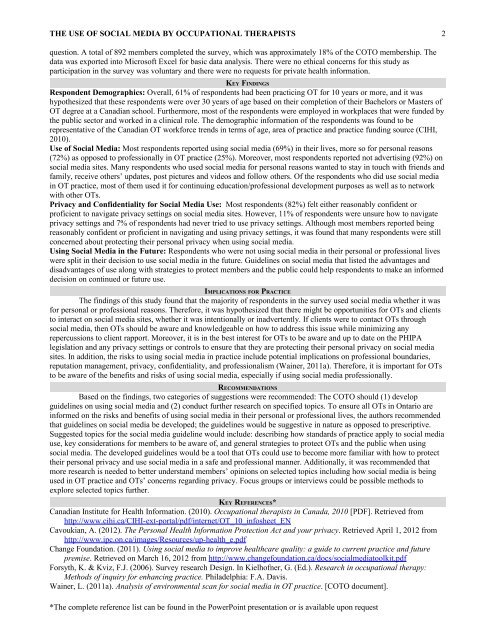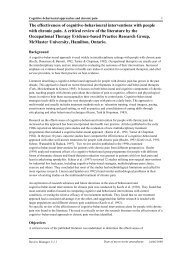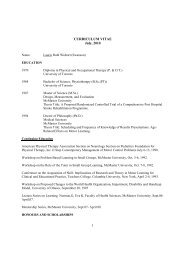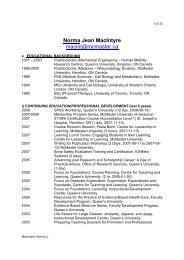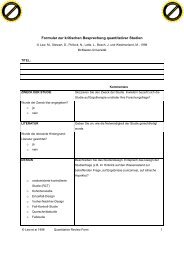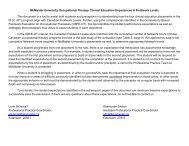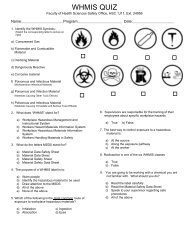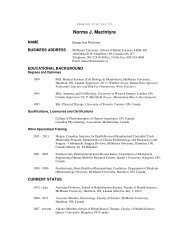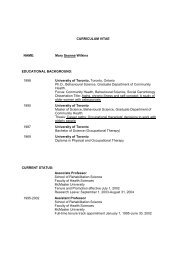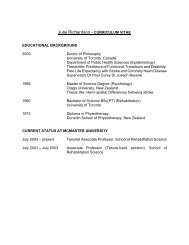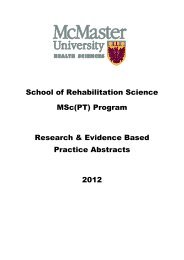Evidence Based Practice Symposium - McMaster University
Evidence Based Practice Symposium - McMaster University
Evidence Based Practice Symposium - McMaster University
Create successful ePaper yourself
Turn your PDF publications into a flip-book with our unique Google optimized e-Paper software.
THE USE OF SOCIAL MEDIA BY OCCUPATIONAL THERAPISTS 2<br />
question. A total of 892 members completed the survey, which was approximately 18% of the COTO membership. The<br />
data was exported into Microsoft Excel for basic data analysis. There were no ethical concerns for this study as<br />
participation in the survey was voluntary and there were no requests for private health information.<br />
KEY FINDINGS<br />
Respondent Demographics: Overall, 61% of respondents had been practicing OT for 10 years or more, and it was<br />
hypothesized that these respondents were over 30 years of age based on their completion of their Bachelors or Masters of<br />
OT degree at a Canadian school. Furthermore, most of the respondents were employed in workplaces that were funded by<br />
the public sector and worked in a clinical role. The demographic information of the respondents was found to be<br />
representative of the Canadian OT workforce trends in terms of age, area of practice and practice funding source (CIHI,<br />
2010).<br />
Use of Social Media: Most respondents reported using social media (69%) in their lives, more so for personal reasons<br />
(72%) as opposed to professionally in OT practice (25%). Moreover, most respondents reported not advertising (92%) on<br />
social media sites. Many respondents who used social media for personal reasons wanted to stay in touch with friends and<br />
family, receive others’ updates, post pictures and videos and follow others. Of the respondents who did use social media<br />
in OT practice, most of them used it for continuing education/professional development purposes as well as to network<br />
with other OTs.<br />
Privacy and Confidentiality for Social Media Use: Most respondents (82%) felt either reasonably confident or<br />
proficient to navigate privacy settings on social media sites. However, 11% of respondents were unsure how to navigate<br />
privacy settings and 7% of respondents had never tried to use privacy settings. Although most members reported being<br />
reasonably confident or proficient in navigating and using privacy settings, it was found that many respondents were still<br />
concerned about protecting their personal privacy when using social media.<br />
Using Social Media in the Future: Respondents who were not using social media in their personal or professional lives<br />
were split in their decision to use social media in the future. Guidelines on social media that listed the advantages and<br />
disadvantages of use along with strategies to protect members and the public could help respondents to make an informed<br />
decision on continued or future use.<br />
IMPLICATIONS FOR PRACTICE<br />
The findings of this study found that the majority of respondents in the survey used social media whether it was<br />
for personal or professional reasons. Therefore, it was hypothesized that there might be opportunities for OTs and clients<br />
to interact on social media sites, whether it was intentionally or inadvertently. If clients were to contact OTs through<br />
social media, then OTs should be aware and knowledgeable on how to address this issue while minimizing any<br />
repercussions to client rapport. Moreover, it is in the best interest for OTs to be aware and up to date on the PHIPA<br />
legislation and any privacy settings or controls to ensure that they are protecting their personal privacy on social media<br />
sites. In addition, the risks to using social media in practice include potential implications on professional boundaries,<br />
reputation management, privacy, confidentiality, and professionalism (Wainer, 2011a). Therefore, it is important for OTs<br />
to be aware of the benefits and risks of using social media, especially if using social media professionally.<br />
RECOMMENDATIONS<br />
<strong>Based</strong> on the findings, two categories of suggestions were recommended: The COTO should (1) develop<br />
guidelines on using social media and (2) conduct further research on specified topics. To ensure all OTs in Ontario are<br />
informed on the risks and benefits of using social media in their personal or professional lives, the authors recommended<br />
that guidelines on social media be developed; the guidelines would be suggestive in nature as opposed to prescriptive.<br />
Suggested topics for the social media guideline would include: describing how standards of practice apply to social media<br />
use, key considerations for members to be aware of, and general strategies to protect OTs and the public when using<br />
social media. The developed guidelines would be a tool that OTs could use to become more familiar with how to protect<br />
their personal privacy and use social media in a safe and professional manner. Additionally, it was recommended that<br />
more research is needed to better understand members’ opinions on selected topics including how social media is being<br />
used in OT practice and OTs’ concerns regarding privacy. Focus groups or interviews could be possible methods to<br />
explore selected topics further.<br />
KEY REFERENCES*<br />
Canadian Institute for Health Information. (2010). Occupational therapists in Canada, 2010 [PDF]. Retrieved from<br />
http://www.cihi.ca/CIHI-ext-portal/pdf/internet/OT_10_infosheet_EN<br />
Cavoukian, A. (2012). The Personal Health Information Protection Act and your privacy. Retrieved April 1, 2012 from<br />
http://www.ipc.on.ca/images/Resources/up-health_e.pdf<br />
Change Foundation. (2011). Using social media to improve healthcare quality: a guide to current practice and future<br />
premise. Retrieved on March 16, 2012 from http://www.changefoundation.ca/docs/socialmediatoolkit.pdf<br />
Forsyth, K. & Kviz, F.J. (2006). Survey research Design. In Kielhofner, G. (Ed.). Research in occupational therapy:<br />
Methods of inquiry for enhancing practice. Philadelphia: F.A. Davis.<br />
Wainer, L. (2011a). Analysis of environmental scan for social media in OT practice. [COTO document].<br />
*The complete reference list can be found in the PowerPoint presentation or is available upon request


